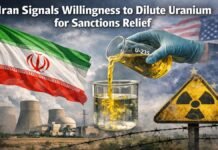
Key Points
- India and Pakistan agreed to a mutual ceasefire effective May 10, 2025, after days of intense cross-border hostilities.
- Ceasefire was brokered directly between the two nations’ military leaders, with no third-party mediation.
- India firmly rejected US President Trump’s offer to mediate on the Kashmir issue, insisting all matters will be resolved bilaterally.
- MEA spokesperson credited Indian military action, especially Operation Sindoor, for compelling Pakistan to seek a ceasefire.
- India warned that any future aggression from Pakistan will be met with decisive retaliation.
- India maintains the only outstanding issue with Pakistan is the return of Pakistan-occupied territories, and progress in ties hinges on Pakistan ending cross-border terrorism.
New Delhi: In a significant development, India and Pakistan have agreed to a ceasefire along the Line of Control (LoC) and other contested sectors, effective from May 10, 2025. The understanding was reached after a period of intense military escalation following the deadly Pahalgam terror attack on April 22, which claimed 26 Indian civilian lives and triggered Operation Sindoor-India’s precision strikes on terror infrastructure inside Pakistan.
How the Ceasefire Was Reached
The ceasefire was finalized during a phone call between the Directors General of Military Operations (DGMOs) of both countries at 3:35 pm on May 10, after Pakistan formally requested the conversation earlier that day. Technical difficulties delayed the hotline, but the call resulted in both sides agreeing to halt all firing and military actions on land, air, and sea from 5:00 pm IST the same day. The DGMOs are scheduled to speak again to ensure the agreement holds.
MEA spokesperson Randhir Jaiswal made it clear that the forceful Indian response-including strikes that disabled key Pakistani airbases-was the reason Pakistan sought a ceasefire. “It was the force of Indian arms that compelled Pakistan to stop its firing,” Jaiswal stated, crediting Operation Sindoor for shifting the balance.
India’s Message: Retaliation for Any Aggression
India has sent an unequivocal message: any future aggression from Pakistan will be met with swift and decisive retaliation. “If the Pakistani armed forces fire, Indian armed forces will fire back; if Pakistan stops, India will also stop,” Jaiswal declared, emphasizing India’s clarity and resolve. He underscored that India does not seek escalation but will not hesitate to defend itself.
No Room for Third-Party Mediation
Amid international speculation, especially after US President Donald Trump’s claim of having helped broker the ceasefire and offering to mediate on Kashmir, India categorically rejected any foreign involvement. “Any issues related to the Union Territory of Jammu and Kashmir are to be resolved bilaterally between India and Pakistan. That policy has not changed,” Jaiswal said. Indian officials reiterated that the only outstanding issue is the return of Pakistan-occupied territories, and progress in relations depends on Pakistan ending its support for cross-border terrorism.
India’s position aligns with the Simla Agreement (1972) and Lahore Declaration (1999), both of which emphasize bilateral resolution of disputes. “We don’t want anyone to mediate. We don’t need anyone to mediate,” government sources reiterated, dismissing Trump’s offer and Pakistan’s welcome of it.
Pakistan’s “Old Habit” of Claiming Victory
Responding to Pakistani Foreign Minister Ishaq Dar’s remarks claiming success, the MEA spokesperson dismissed them as part of Pakistan’s “old habit” of beating drums after setbacks. Jaiswal urged the public and media to verify claims using available satellite imagery and pointed out that India’s strikes had destroyed terror infrastructure in Bahawalpur, Muridke, Muzaffarabad, and other locations.
A “New Normal” in India’s Response
India has declared a “new normal” in its approach to cross-border terrorism, warning Pakistan that nurturing terror on an industrial scale will no longer go unanswered. The MEA emphasized that any progress in bilateral ties is contingent on Pakistan vacating illegally occupied territories and ending support for terrorism.
What’s Next?
- The ceasefire is being closely monitored, with both militaries maintaining DGMO-level communications for real-time conflict management.
- India has suspended the Indus Waters Treaty until Pakistan credibly ends cross-border terrorism.
- The government remains vigilant, with the ceasefire described as a “pause” rather than a permanent end to hostilities, depending on Pakistan’s actions going forward.
India’s stance is clear: it will not tolerate cross-border terrorism or third-party interference in its internal matters. The ceasefire is a result of direct military and diplomatic engagement, and any violation will be met with forceful response, setting a new precedent for regional security and diplomacy.




















































